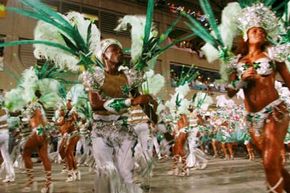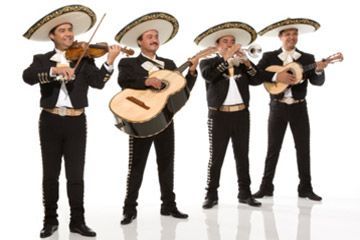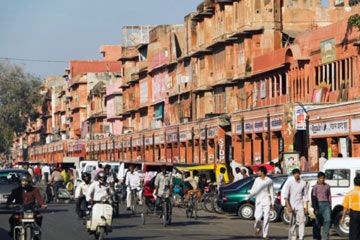Brazilian Carnival
Carnival (actually Carnaval in Portuguese) is a wild celebration of food, alcohol, music and fun. It's held annually for a few days before the start of Lent, the 40-day period of fasting, abstinence and repentance that's observed by the Roman Catholic Church before Easter. The word carnival comes from the Latin carne vale, or "farewell to the flesh" [source: Rosenberg].
The Portuguese brought the practice of Carnival to Brazil around 1850, patterning it mainly on the Parisian tradition of holding masquerade parties and balls at this time of the year. However, the Brazilians morphed it into a version uniquely their own over time, adding in elements from the people's African and indigenous cultural backgrounds. Thus, Carnival in Brazil eventually incorporated lots of parades, elaborate costumes, music, dancing and balls. A tradition also developed where people dress up in opposing roles: men dress as women, aristocrats dress as commoners, the poor dress as the rich.
Advertisement
Carnival is held all over the country; celebrations differ a bit by region, but Rio de Janeiro's celebration is the most popular, drawing crowds of 500,000 foreigners annually from across the globe [source: Rio Carnival]. One of the highlights of Rio's Carnival is its elaborate parades, staged by major samba schools. The samba schools work year-round to prepare for their Carnival parade entry, and the immense Sambodromo (samba stadium) facility was built specifically to showcase the parades [source: Just Brazil].
While all Brazilians love Carnival, the black communities are its most avid participants. This likely stems from the community's historical love of Carnival, as African slaves were freed annually for the festival's duration. In Rio, residents of the city's (largely black) favelas, or slums, are especially enamored of Carnival, joining samba schools and working hard on costumes. To them, carnival and samba are as beloved and important as soccer [source: Rio Carnival].
Related Articles
- Geography of Rio de Janeiro
- Geography of South America
- History of Brazil
- How a Bikini Wax Works
- Travel the World Quiz: Brazil
More Great Links
Sources
- Brazil Travel Information. "Carnival." (Aug. 8, 2011) http://www.braziltravelinformation.com/brazil_carnival.htm
- Brazil-Travel-Northeast. "Brazil culture and Brazil traditions." (Aug. 8, 2011) http://www.brazil-travel-northeast.com/brazil-culture.html
- Brazilian Bikini Bottom. "Brazilian Bikini Bottom." (Aug. 11, 2011) http://brazilianbikinibottom.com/
- Cape Cod Justice of the Peace. "Brazilian Wedding Traditions." (Aug. 8, 2011) http://www.capecodjusticeofthepeace.com/BrazilianPage.html
- Capoeira. "The History of Capoeira." (Aug. 8, 2011) http://www.capoeira.htmlplanet.com/capoeira_hist.htm
- Capoeira NYC. "History & Ethnomusicology." (Aug. 8, 2011) http://www.capoeiranyc.com/study.html
- Capoeira Universe. "Capoeria History." June 11, 2011. (Aug. 8, 2011) http://capoeirauniverse.com/capoeira-history/
- Copacabana. "Statue of Christ the Redeemer: History & Pictures." (Aug. 11, 2011) http://www.copacabana.info/Christ-the-Redeemer-history.html
- Corcovado. "The Statue of Christ." (Aug. 11, 2011) http://www.corcovado.com.br/cristo_redentor_ing.html
- Every Culture. "Brazil." (Aug. 8, 2011) http://www.everyculture.com/Bo-Co/Brazil.html
- FIFA. "Previous FIFA World Cups." (Aug. 18, 2011) http://www.fifa.com/worldcup/archive/index.html
- Food by Country. "Brazil." (Aug. 8, 2011) http://www.foodbycountry.com/Algeria-to-France/Brazil.html
- The History of Christmas. "Brazil – Christmas traditions & customs." (Aug. 8, 2011) http://www.thehistoryofchristmas.com/traditions/brazil.htm
- Info Please. "Brazil." (Aug. 8, 2011) http://www.infoplease.com/ce6/world/A0808783.html
- Just Brazil. "Brazil Carnaval." (Aug. 8, 2011) http://www.justbrazil.org/brazil/brazil-carnaval.asp
- Kwintessential. "Brazil – Language, Culture, Customs and Etiquette." (Aug. 8, 2011) http://www.kwintessential.co.uk/resources/global-etiquette/brazil-country-profile.html
- Meu Brasil Brasileiro. (Aug. 11, 2011) http://www.meubrasilbrasileiro.eu/merletti.php
- Nations Online. "Current World Population." (Aug. 12, 2011) http://www.nationsonline.org/oneworld/world_population.htm
- Rio Carnival. "The Guide for Carnival in Rio de Janeiro." (Aug. 8, 2011) http://rio-carnival.net/
- Rio Janeiro. "Traditional Brazilian Food." Aug. 30, 2009. (Aug. 8, 2011) http://www.riojaneiro.eu/2009/08/traditional-brazilian-food/
- Rosenberg, Dan. "History of Carnival in Brazil." Afropop. (Aug. 8, 2011) http://www.afropop.org/multi/feature/ID/33/
- Slide Share. "Brazil Project." (Aug. 11, 2011) http://www.slideshare.net/vinit1/brazil-project
- Think Quest. "Customs and Traditions." (Aug. 8, 2011) http://library.thinkquest.org/C004179/customs.htm
- U Should Visit. "Traditional Dress for Brazil." (Aug. 8, 2011) http://ushouldvisit.com/south-america/brazil/Traditional-Dress-For-Brazil.html



